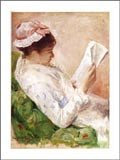 Knitting Pearls: Writers Writing About Knitting by Ann Hood
Knitting Pearls: Writers Writing About Knitting by Ann HoodMy rating: 3 of 5 stars
Knitters, in my experience, are readers as well. We don't just read about knitting, although many famous knitters are also writers who write about knitting. Perhaps I generalize, but I believe that a collection of essays about knitting is designed to appeal mainly to knitters, since the editor will expect us to identify and empathize with them.
With a few exceptions, this collection will satisfy. Those exceptions are essays in which knitting is so tangential to the essay that one wonders why they were included, or in which the author calls knitters and knitting "...a chew-gum-and-walk-at-the-same-time crowd and an occupation ideal for a zombie. What does he know?
Some examples of excellence:
-- Anne Bartlett, whose growth as a knitter and novelist includes designing an intarsia version of a Scott Joplin rag while editing a book about former cannibals. (Former!)
-- Jared Flood, whose father gives him an old, iconic sweater knitted by his mother, "a veritable Swiss Army knife" of crafting.
-- Clara Parkes, who sees her UFOs* and calls them "beautiful limerence of our first few rows rows together... my personal museum of optimism." (*for the muggles, UFOs are unfinished objects.)
-- Diana Gabaldon, who says "everything you experience forms you as a writer. Why should knitting be an exception?"
Those who do not knit have insights, too - Jane Hamilton, for example, who lives on a sheep form, but chooses not to knit the beautiful, soft yarn milled from her flock. She lived for one summer with the last authentic creator of Harris Tweed, Miss Campbell. There, in the Outer Hebrides, she scraped lichen for dyes while the old woman spun and wove, selling fabric from her kitchen. Hamilton even knitted a scarf, but only because she was cut off from her family except for aerogrammes, deprived of radio and television, and forbidden by Miss Campbell to read. The scarf turned out so "...alarming that probably in this day and age TSA would shut the place down" when she discarded the thing at the airport. A novel is a miracle, she writes, and she has chosen "the miracle of language, the texture and song of speech... so absent on the heath" for her own life's work, her own material.
The book disappoints in two important ways. The first: it is arranged alphabetically by author, not by theme, and thus seems haphazard. The second: what were they thinking? Including six knitting patterns without even line drawings to tempt the reader to try them?
Recommended, in small doses, for knitters and for fans of the included authors.
I received this book from Goodreads, and this is a fair review.
View all my reviews






















